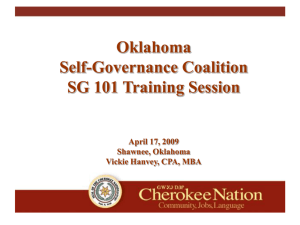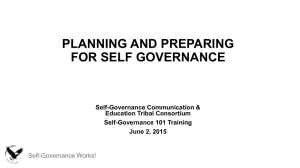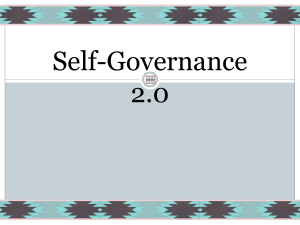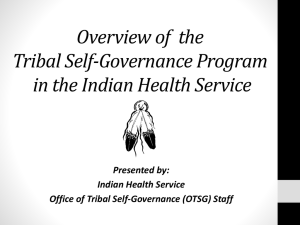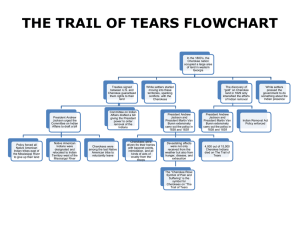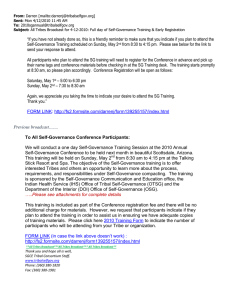Cherokee Nation - Self
advertisement
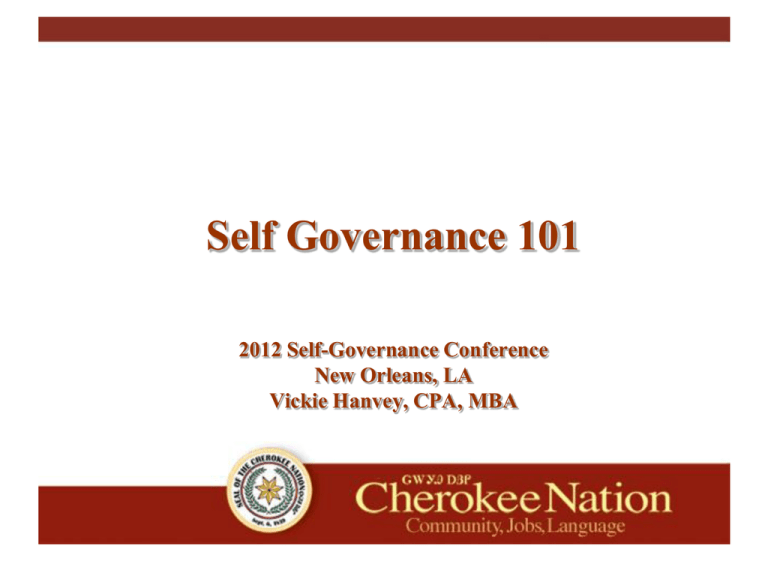
Self Governance 101 2012 Self-Governance Conference New Orleans, LA Vickie Hanvey, CPA, MBA Self-Governance The Cherokee Nation existed before the United States and the State of Oklahoma. •GROUP OF CHEROKEES WHO VISITED LONDON IN 1762 Self-Governance TreatiesNation-to-Nation agreements “A treaty is, in its nature, a contract between two nations…is carried into execution by the sovereign power of the respective parties to the instrument.” Chief Justice Marshall1829 Treaties of the Cherokee Nation Date of Treaty Area in Acres Date of Treaty Oct. 2, 1798 Area in Acres 609,280 1721 1,678,720 Nov. 24, 1755 5,526,400 Oct. 14, 1768 544,000 Oct. 24, 1804 86,400 Oct. 18, 1770 2,880,000 Oct. 25, 1805 695,040 96,000 Oct. 27, 1805 800 160,000 Jan. 7, 1806 1772 6,486,400 279,680 375,680 Mar. 22, 1816 Sept. 14, 1816 672,000 May 17, 1775 14,464,000 1,696,000 94,720 2,194,560 2,560 220,800 June 1, 1773 3,372,160 July 8, 1817 373,120 1,541,120 Feb. 27, 1819 535,680 May 20, 1777 1,312,640 1,541,120 July 20, 1777 2,824,960 986,880 1,126,400 May 6, 1828 May 31, 1783 1,056,000 Dec. 29, 1835 Nov. 28, 1785 352,000 4,609,280 586,880 1,611,520 2,198,400 711,680 July 2, 1791 462,080 July 19, 1866 3,020,800 949,760 1,233,920 Self-Governance Cherokee Nation ceded 81 million acres of land between 1721 and 1835 Self-Governance • U.S. Constitution recognizes Indian nations as governments • U.S. Supreme Court has affirmed that Indian tribes retain their governmental powers unless specifically limited by law. Self-Governance • • Cherokee case law from the 1830’s forms the basis for the unique Federal/Tribal relationship today. Cherokee Nation vs. Georgia Worchester vs. Georgia Chief Justice John Marshall Tribes are “distinct, independent political communities, retaining their original natural rights.” “domestic dependent Nation” Self-Governance Hostile Federal Policy Friendly Federal Policy 1730 Germ Warfare 1750 Great Britain Treaty 1770 Genocide by colonists and later Americans 1790 Civilization Program 1830 Removal 1840 Rebuilding Cherokee Nation "Golden Age" 1860 American Civil War 1870 Reconstruction 1890 Allotment; Forced Assimilation 1908 Bureaucratic Imperialism by BIA 1930 Depression 1940 Reorganization 1950 Relocation 1975 Self- Governance and Social Service Programs Self-Governance Indian Self-Determination Policy recognizes the Indian governments’ rights to self-govern and administer their own programs and operations. Self-Governance The Secretary is prohibited from waiving, modifying, or diminishing in any way the trust responsibility of the United States with respect to Indian tribes and individual Indians that exists under treaties, Executive orders, other laws, or court decisions. Self-Governance Statutory Authority: • P.L. 93-638, as amended 1975 1987 1988 1992 1994 2000 ISDEA Arizona Republic “Fraud in Indian Country” Tribal Self-Governance Demonstration Project DOI Demonstration Project extended to IHS Authorization of SG as permanent option for DOI Authorization of SG as permanent option for IHS Self-Governance (ISDEA) Indian Self-Determination and Education Assistance Act Title I Title II Title III Title IV Title V Indian Self-Determination Act Indian Education Programs Tribal Self-Governance Demonstration Act (repealed) Department of Interior (Title IV Amendments) Indian Health Service (Title VI Other HHS Agencies) Self-Governance Ability to negotiate a single compact and funding agreement for all PSFAs • Compact: •Umbrella agreement •General terms •Long term • FA: •PFSAs •More specific terms •Short term (1-3 years) Self-Governance Tribal Self-Governance demands careful and ongoing assessment of the Tribal organization and its operations. Self-Governance • Major components of an Ongoing Process Planning Negotiations Implementation Monitoring Self-Governance • Approached ISDEA assumption in • incremental steps Gradually assumed federal programs & reallocated/redesigned federal “cookie cutter” programs into programs and services responsive to our unique, specific needs Self-Governance Comments/Observations: Acronyms Develop a Resource Library Develop a SG historical records system Importance of coordination and networking with other Tribes (NCAI, NIHB, TSGAC, etc) Self-Governance Comments/Observations: Build a “Team” of experts (Legal, Financial, Programmatic, etc) Maintain periodic analysis of Funding Tables, Payments, etc Challenge information/responses from agencies Resolution to issues can be a slow process
